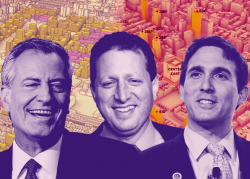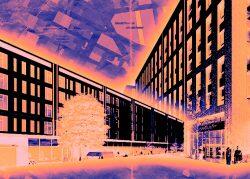One developer’s concession is another City Council member’s “bread crumbs.”
Developers trying to save One45, a proposed 915-unit project in Harlem, added 150 income-restricted units to their plan Tuesday, bringing the portion of affordable units to 40 percent.
That is more than nearly every project in the city’s Mandatory Inclusionary Housing program, which mandates up to 30 percent affordability.
But local Council member Kristin Richardson Jordan was not impressed. In fact, she was outraged.
Jordan blasted the proposal, saying the project remains unaffordable to most Harlemites. She called the addition of the affordable units “11th-hour bread crumbs” by Bruce Teitelbaum and his partners and said its inclusion of just two dozen apartments for the lowest income tenants was “a slap in the face.”
“Mandatory inclusionary housing is not affordable,” Jordan said during a hearing Tuesday. “It does not apply to the humans who actually live in our district, in our community.”
Her reaction does not bode well for the project, which requires the site to be rezoned — a power granted by City Council custom to the local member. There have been rare exceptions for projects seen as having citywide importance, such as lab space for the New York Blood Center. But after the Rev. Al Sharpton withdrew his support for One45, Jordan’s colleagues made it clear that they would defer to her in Harlem.
One45 could test whether Mayor Eric Adams will intervene in such disputes. His administration has already framed the project as a citywide issue: City Planning Chair Dan Garodnick praised it as an opportunity to help put a “dent” in the city’s “acute housing crisis” — and that was before the developer added 150 affordable units.
Read more



The project has the backing of 32BJ SEIU and the laborers union, Local 79, but union support does not guarantee approval. For example, 32BJ and the New York Building and Construction Trades Council backed Bruce Eichner and his Continuum Company’s 960 Franklin Street development, yet it still failed.
Moreover, one construction union opposes One45. The New York City District Council of Carpenters submitted testimony against it, noting that, unlike the Blood Center, the two-tower residential project will not be constructed solely with union labor.
During a hearing by the City Council’s subcommittee on zoning and franchises Tuesday, several Council members expressed concern over the carpenters’ opposition. A representative for the developer said it was open to negotiating with the carpenters but that it could not promise to hire only union workers. (Affordable housing developers say higher labor costs require higher rents.)
The carpenters also pointed to the elephant in the room: the exit of a Sharpton-backed cultural institution that could have provided a citywide benefit.
The Museum of Civil Rights, founded by Sharpton and Judge Jonathan Lippman was originally expected to be located at One45. A representative of the developers, Tristan Nadal, said they and the museum’s founders had mutually agreed that the museum’s space was better suited for more affordable and senior housing.
One45 developer Teitelbaum proposed adding 70 “moderate income” units and 90 for tenants making, on average, 30 to 50 percent of area median income, with a focus on seniors. A majority of the affordable apartments, 207, would still be reserved for those earning an average of 60 percent of the area median income, under MIH.
Jordan has said she would only approve a project with 100 percent affordability, with 57 percent of the units for tenants earning 30 percent or less of AMI; 16 percent for those making 50 percent or less; 16 percent for those making 80 percent or less; and 11 percent for those making 130 percent.
Developers lose money on every affordable unit; the logic of the Mandatory Inclusionary Housing law is that market-rate units subsidize the affordable ones.
At the hearing, Nadal and Jordan blamed each other for failing to negotiate. Jordan said she would not meet with the developers alone, that negotiations would need to be open to the community. Nadal said developers were open to meeting and to a racial impact study for the project, but hesitated at negotiating publicly.
Without the zoning change, the developers can still build roughly 40 apartments, none of which would be required to be affordable. When reached Tuesday afternoon, Teitelbaum said he hopes it does not come to that.
As to whether the City Council will support the project, he said it would be “very difficult for any reasonable, objective person to reject the idea” of hundreds of new apartments.
“I’m hopeful and confident that objective, reasonable people will recognize that our plan to build 915 units of housing at a time when there’s an acute housing crisis is, as I would say, quoting one of my favorite films, an offer that is too good to refuse,” he said.
He added, “While it may not be 100 percent of what everyone wants, it is a darn good proposal that I think at the end of the day will prevail.”
Pat Ralph provided additional reporting.
